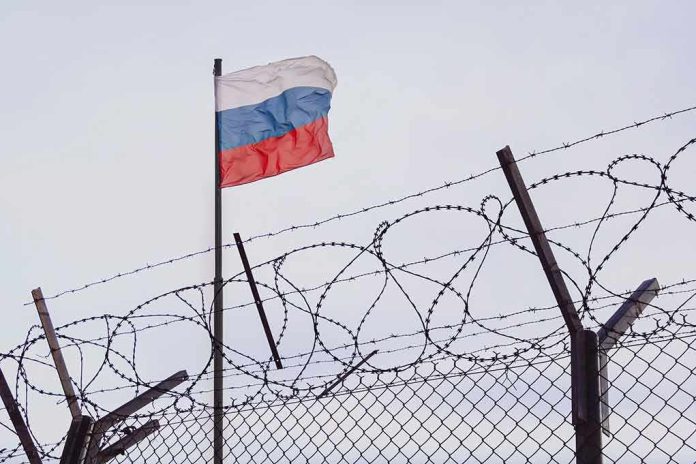
Russia celebrates President Trump’s decision to halt U.S. weapons shipments to Ukraine, declaring it will bring a faster end to the conflict as Ukrainian forces struggle to maintain defense operations without crucial missile systems.
Key Takeaways
- The Kremlin welcomes reduced U.S. weapons deliveries to Ukraine, claiming it will expedite the conflict’s conclusion as Russia continues territorial advances.
- The White House has halted shipments of critical weapons systems, including Patriot air defense missiles and 155mm artillery rounds, to prioritize America’s military readiness.
- Ukraine warns that cutting weapons supplies will only encourage Russia to prolong the war while leaving Ukrainian cities vulnerable to increased missile and drone attacks.
- Military experts caution that Ukraine’s diminished defensive capabilities will weaken its negotiating position, potentially forcing unfavorable peace terms.
- Russia currently controls approximately 20% of Ukrainian territory and has made significant recent advances while Ukrainian forces struggle with equipment shortages.
Kremlin Celebrates American Weapons Cutoff
Russian officials have openly celebrated President Trump’s decision to halt critical weapons shipments to Ukraine, framing it as a decisive turning point in what they continue to call their “special military operation.” The Kremlin’s position represents a stark contrast to urgent warnings from Kyiv about the consequences of reduced military support. Moscow has consistently maintained that Western weapons deliveries have only prolonged the conflict, and now sees the American policy shift as vindication of their stance and a potential pathway to victory on their terms.
“The fewer the number of weapons that are delivered to Ukraine, the closer the end of the special military operation,” declared Kremlin spokesman Dmitry Peskov.
The White House announced the weapons pause following a Department of Defense review that concluded certain systems previously promised to Ukraine should be withheld to prioritize America’s military readiness. This decision affects multiple critical defense systems, including Patriot air defense missiles, 155-millimeter artillery rounds, GMLR missiles, Stinger missiles, and Hellfire missiles – many of which form the backbone of Ukraine’s ability to defend against Russian aerial attacks and artillery barrages.
America First Policy Takes Precedence
The decision to halt weapons shipments reflects President Trump’s longstanding commitment to prioritizing American interests and military readiness. The administration has expressed particular concern about maintaining adequate stockpiles for potential conflicts with China and ensuring the U.S. military remains at peak readiness. This reprioritization comes after more than two years of substantial American military aid to Ukraine, which has depleted certain U.S. weapons stockpiles to concerning levels according to Pentagon assessments.
“This decision was made to put America’s interests first following a Department of Defense review of our nation’s military support and assistance to other countries across the globe. The strength of the United States armed forces remains unquestioned. Just ask Iran,” said Deputy White House Press Secretary Anna Kelly.
Some Republican lawmakers have applauded the move as a necessary correction after what they characterized as the previous administration’s excessive focus on Ukraine at the expense of American military readiness. The U.S. has sent tens of billions of dollars in military aid to Ukraine since February 2022, raising concerns about diminished stockpiles for America’s own defense needs. The decision also aligns with President Trump’s campaign pledges to end American involvement in foreign conflicts and redirect resources toward domestic priorities.
Chairman Rogers, Chairman Wicker Joint Statement on Putin’s Rejection of Immediate Ceasefire with Ukraine
Washington, D.C. – @RepMikeRogersAL, Chairman of the House Armed Services Committee, and @SenatorWicker, Chairman of the Senate Armed Services Committee, today responded to…
— Armed Services GOP (@HASCRepublicans) March 13, 2025
Ukraine’s Deteriorating Position
Ukrainian officials have responded with alarm to the American weapons pause, warning that it will embolden Russia to intensify its offensive operations. Kyiv has emphasized that its air defense systems are already stretched to the breaking point, with Russian forces launching massive missile and drone attacks against civilian infrastructure. Without replenishment of critical air defense missiles, Ukrainian cities face increased vulnerability to devastating strikes against power plants and water systems as winter approaches.
“If you want to negotiate a peace settlement, it’s always better to negotiate from a position of strength. And that position of strength comes by continuing for the United States and our Western allies to supply arms, aid, and material to the Ukrainians so they can continue to fight this illegal aggression,” said Maj. Gen. David Baldwin (Ret.).
Russia currently controls approximately 20% of Ukrainian territory and has made significant territorial gains in recent months as Ukrainian forces struggle with ammunition shortages. Military analysts note that without sustained Western support, Ukraine faces the prospect of additional territorial losses and a significantly weakened negotiating position. The Czech Republic, which has coordinated a multinational ammunition initiative for Ukraine, has also indicated uncertainty about continued support pending upcoming elections.
Potential Path Forward
The current trajectory suggests a potential shift toward diplomatic solutions, albeit on terms increasingly favorable to Russia. French President Emmanuel Macron recently urged a ceasefire during a call with Russian President Vladimir Putin, indicating growing Western interest in finding an exit from the conflict. For Ukraine, the reduced weapons flow creates immediate tactical challenges on the battlefield and diminishes leverage in any future negotiations, potentially forcing difficult concessions regarding territory and sovereignty.
“They’re not quite ready, and they’re certainly not ready to start producing super sophisticated weapons systems like Patriots. The answer is, unfortunately, a tough one for the United States government. I would recommend that they continue to support the Ukrainians, because that fight is happening right now,” said Maj. Gen. David Baldwin (Ret.).
The Kremlin’s assessment that fewer weapons will bring a faster end to the conflict may prove accurate, though not in the manner Ukraine and its allies had hoped. Without sufficient defensive capabilities, Ukraine’s ability to resist Russian advances will likely diminish, potentially leading to a resolution that reflects battlefield realities rather than international principles regarding territorial integrity. This outcome would align with Russia’s long-term strategic objectives while testing Western resolve to maintain unity and support for Ukraine under increasingly challenging circumstances.




